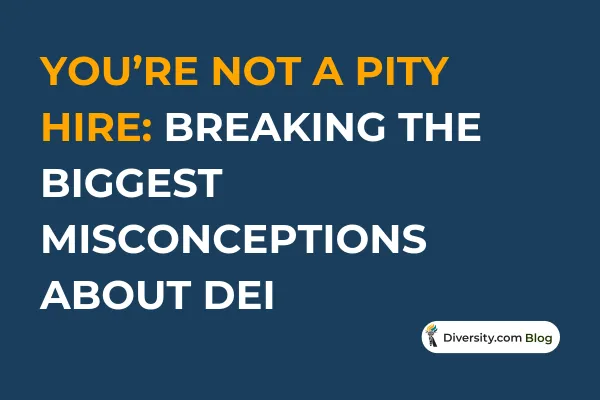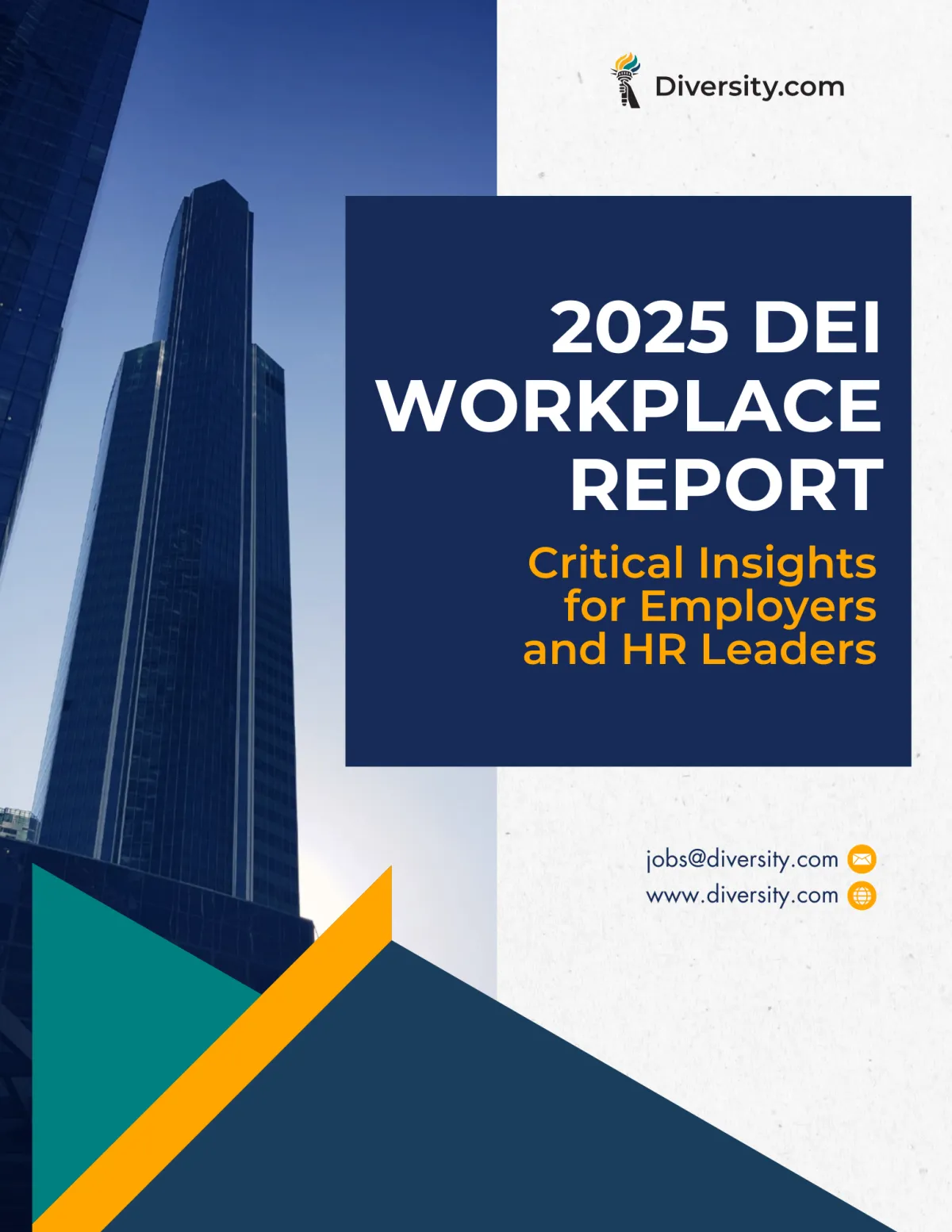
You’re Not a Pity Hire: Breaking the Biggest Misconceptions About DEI
There’s a growing backlash against DEI programs, and it’s coming from multiple directions.
Some of the loudest critics are people from underrepresented communities themselves, who worry they’re being seen as charity cases.
Others feel left out, convinced that DEI means they’re being replaced, ignored, or unfairly treated.
Let’s get one thing straight: DEI isn’t about handing out pity. It’s about clearing out the barriers that kept capable people invisible for too long.
Whether you're skeptical because you don't want to be pitied, or because you feel you're being pushed aside, it’s worth taking a closer look at what DEI really means, and what it doesn’t.
Misconception 1: DEI means hiring underqualified people
Let’s be real. DEI isn’t about lowering the bar. It’s about removing the invisible hurdles that have always been there for some.
Many of the people hired through inclusive pipelines are just as qualified, if not more, but were previously passed over due to bias, not skill.
Companies that implement strong DEI hiring practices don’t skip qualifications. They broaden the pool.
A Harvard Business Review analysis found that diverse teams are more likely to outperform homogeneous teams, not less (Rock, Grant, & Grey, 2016).
Misconception 2: "I was only hired because I’m a woman, Black, gay, disabled, etc."
This internalized doubt is one of DEI’s hardest shadows. But it’s not truth. It’s a distortion caused by years of being told you’re less.
Imposter syndrome often hits hardest in underrepresented groups. That doesn’t mean you aren’t qualified.
Consider this: Barack Obama, Indra Nooyi, Sundar Pichai, Chimamanda Ngozi Adichie, and Ruth Bader Ginsburg were all once minorities in their fields. Were they pity hires?
If you made it into the room, chances are you’ve already worked harder than many of your peers to be seen.
Misconception 3: DEI is reverse discrimination
Some critics argue that DEI is unfair to majority groups. But fairness and equity aren’t about taking something from one group. They’re about removing built-in advantages that others never had.
Equity does not equal favoritism. It means leveling the playing field.
When you’ve always had a head start, fairness can feel like loss. But it’s not.
DEI initiatives don’t mean excluding white men. In fact, inclusive companies benefit everyone, including white men.
Misconception 4: DEI makes people feel like victims or charity cases
Some minorities are uncomfortable with DEI because they don’t want to be seen as needing help.
That’s valid, but let’s separate support from pity.
DEI isn’t about painting anyone as weak. It’s about acknowledging the system, not the individual, is what’s been broken.
If we don’t name the gap, we can’t close it.
Asking for fairness doesn’t mean you’re asking for sympathy. It means you’re demanding truth. And truth is power.
The truth: DEI doesn’t create stars. It stops burying them.
We’ve always had brilliant Black scientists, Indigenous leaders, queer creatives, disabled innovators, and first-gen founders. DEI doesn’t invent them. It amplifies what’s already there.
Example: Katherine Johnson, the Black woman who helped launch NASA’s success, wasn’t a DEI hire. She was genius. DEI just means we no longer miss people like her.
Frida Kahlo, James Baldwin, Maya Lin, Marsha P. Johnson. DEI is the reason we look back and say: How did the world almost miss them?
For those who feel DEI has left them behind:
If you feel displaced, ignored, or silenced by DEI, ask yourself:
Were you truly excluded, or are you just now being asked to share the space?
Is this discomfort from losing opportunity, or from losing unearned comfort?
Your worth was never based on others being kept out. It was based on your contribution. That hasn’t changed.
For white professionals who feel DEI is against them:
It’s understandable to feel disoriented when the workplace starts talking about equity and privilege, especially if you’ve worked hard, made sacrifices, and never thought of yourself as part of the problem.
But here’s the hard truth: Privilege isn’t a personal accusation. It’s a systemic reality.
No one is saying you didn’t work hard. What DEI says is that some people had to work harder just to get to the same starting line.
Being asked to share space isn’t the same as being pushed out. If it feels that way, it might be worth asking: Why does equality feel like a threat?
And if you’ve ever thought, “Well, I never owned slaves” or “I grew up poor too” — that’s valid.
Class struggle is real. But so is the cumulative advantage that comes with how society perceives you.
DEI isn’t erasing white people. It’s asking everyone to build systems that don’t rely on exclusion to maintain comfort.
You can still succeed. You can still rise.
In fact, you can be a powerful ally who helps others rise, too.
Conclusion
DEI isn’t a favor. It’s a correction.
If you’re hired through a DEI lens, don’t shrink. Stand taller. You’re part of what’s fixing a broken system.
And if you’re questioning DEI’s value, consider this: It’s not about stepping on you. It’s about finally letting others step forward.
How Diversity.com Supports Inclusive Hiring
At Diversity.com, we believe talent shouldn’t go unseen because of outdated systems or unchecked bias. Inclusion is the foundation of a stronger workforce.
As a leading DEI job board, we help job seekers and employers connect in a space built on authenticity, equity, and respect.
For Employers & HR Leaders:
✔ Post Inclusive Job Listings — Reach a diverse pool of candidates by highlighting your organization's commitment to DEI.
✔ Access DEI Resources — Utilize our curated content to inform and enhance your DEI strategies.
✔ Engage with a Community — Connect with like-minded professionals dedicated to advancing workplace diversity.
For Job Seekers:
✔ Find inclusive employers — Discover organizations that prioritize equity and inclusion in their hiring practices.
✔ Enhance Your Profile — Showcase your experiences and skills to employers committed to DEI.
✔ Stay Informed — Access articles and resources to support your career development in inclusive workplaces.
We believe in a future where every career journey and every hire moves us closer to true equity.
Start building with Diversity.com.
If you have any questions or need assistance, feel free to Contact Us Here. Our dedicated support team is ready to help!
Related Articles
Debunking the Myth: DEI Doesn’t Mean Lowering Hiring Standards
DEI Doesn’t Lower Hiring Standards. Here’s the Data That Proves It
Cultural Taxation in the Workplace: The Hidden Burden on Minority Employees
Tokenism at Work: How to Spot It and Replace It With Real Inclusion
The Rise of DEI Fatigue: Navigating the Challenges and Reaffirming Commitments
Microaggressions in the Workplace: Unpacking the Subtle Acts of Exclusion
Code-Switching in the Workplace: Navigating Identity and Professionalism
Sources & References
Rock, D., Grant, H., & Grey, J. (2016, November 4). Why diverse teams are smarter. Harvard Business Review. https://hbr.org/2016/11/why-diverse-teams-are-smarter
Steele, C. M. (2010). Whistling Vivaldi: How stereotypes affect us and what we can do. W. W. Norton & Company.
Thomas, D. A., & Ely, R. J. (1996, September). Making differences matter: A new paradigm for managing diversity. Harvard Business Review. https://hbr.org/1996/09/making-differences-matter-a-new-paradigm-for-managing-diversity

